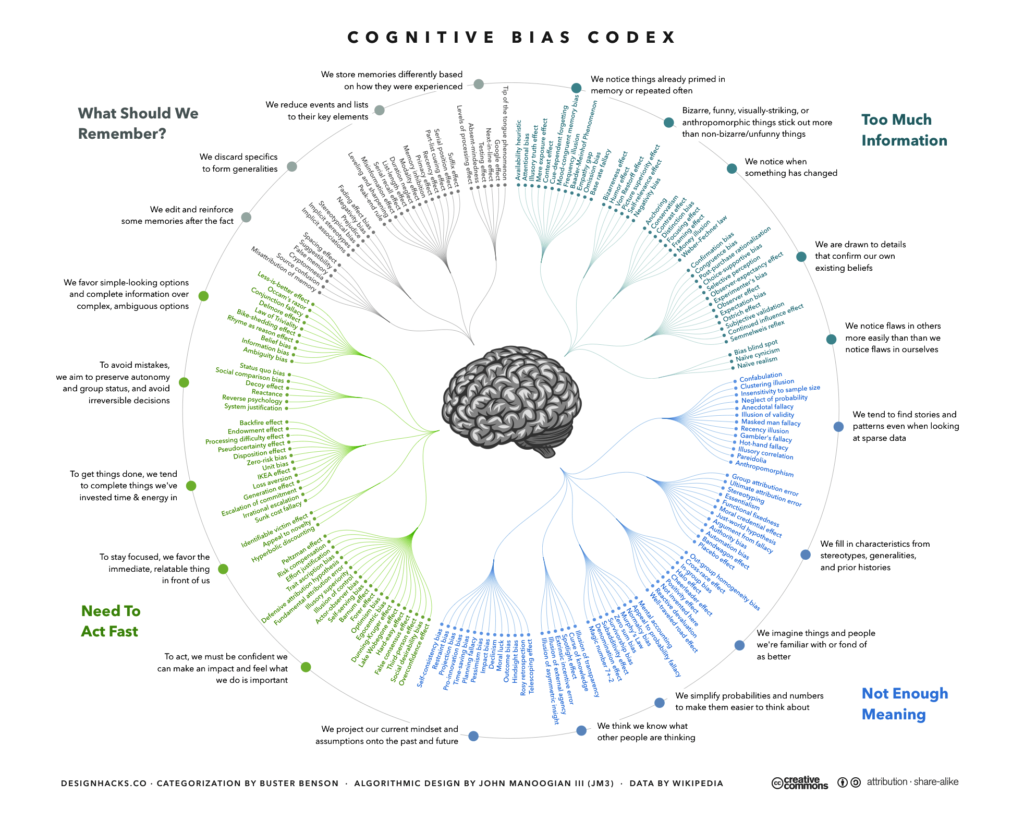I Feel, Therefore I am Not
First to set some context, I have been in exploring for the better part of the past year three large influencing mindsets on the subject of rational reasoning versus emotional intuition, and subconscious versus conscious thought. These mindsets are exemplified by their source readings:
- David Brooks’ The Social Animal, which argues that the emotional mind is far more essential and active in the day to day (see also The Emotional Dog and its Rational Tail by Jonathan Haidt)
- Eliezer Yudkowsky’s Harry Potter and The Methods of Rationality (aka HPMOR), which emphasizes the need for focused purely-rational reasoning, performed using Bayesian principles to arrive at rational thought, overcoming the limitations of the irrational mind.
- Daniel Kahneman‘s Thinking Fast And Slow – Which argues that the brain’s desire for consistency (e.g. Caldiani‘s Consistency in Influence) overwhelms emotion and undermines the argument that the brain is even biologically capable of rational thought in the first place. In this bucket, I also throw in the incredible Phantoms in the Brain by Ramachandran – who got at these issues from a neuroscientific perspective 20 years ago.
These three mindsets may be rooted in very different disciplines (anthropology, behavioural economics, mathematics, psychology, medical, artificial intelligence) – but there is a lot of overlap. They all agree upon the mastery the irrational mind over the rational mind – the rational tail to the emotional dog.
Contrast wise, however, they all have subtle differences in how they judge and embrace the rational mind. They logically separate out from each other in nearly the exact same ways of how to approach existentialism, nihilism and absurdism (a parallelization that is almost worthy of its own modicum). Brooks embraces the emotional mind as rich in material and one to be unlocked (absurdism). EY takes the vulcan approach and attempts to tame it through bayesian principles (existentialism). Kahneman laughs and says you are just doomed (nihilism).

To clarify my own starting point, I must admit my weakness of being a sensitive man (as I’ve been reminded of, dear god). And thus, I naturally waiver in the direction of my favorite Scot when he writes:
Reason is, and ought only to be the slave of the passions, and can never pretend to any other office than to serve and obey them.
David Hume
Rationality and The Cogito
Now to the meat of this week’s Modicum – how to confront self awareness and personal growth in the light of such chaos, once the farce that is consciousness and rationality is dissolved. It is quite the disquieting realization when you no longer can stare at oneself wide eyed and with open eyes.
In the world of philosophy, it is clear that these three works have squarely put one of the philosophical core tenants on notice (aka, The Cogito):
Cogito, ergo sum.
Descartes
(I think, therefore I am)
If you reject rationality, then the “I think” portion is thrown to the wind. “I think that I think, but anything I think is fallible”. It is in this extra clause that the assault on the Cogito becomes even more fascinating.
Arguably, the most overlooked word in the Cogito is “ergo” – which now comes front and center. Saying “therefore” implies rational deduction, which is now proven faulty (far more than the assertion that we think), and therefore, the Cogito is in complete shambles.
Thinking of Bayesian principles, Descartes was striving to get just one indubitable statement – and having to shed away belief after belief as being just (arguable probabilistic) approximations of reality. But even rationality encapsulated in the word ergo is at best a Bayesian approximation of certainty, never reaching 100%.
I feel and can be certain of nothing more
Geoff Peters, before Reading Nick Bostrom
It is humorous because strictly the idea of exploring the “therefore” being the point at which the Cogito unravels is like evoking of Gödel’s Second Incompleteness Thereom. (Thanks to Mark for brilliantly referencing this!). Existence was already doomed, because we used rationality (the word therefore) to prove its presence, and using rationality (the word think) as its definition. A consistent math system cannot prove its own consistency! Such a conclusion is worse than Kahneman – I don’t know where it lands past nihilism!
Which leads me to an aside of Lao Tzu:
Existence is beyond the power of words to define. Words may be used, but none are absolute. If a word be needed, let that word be Wonder, and from Wonder to Wonder, existence opens.
Lao Tzu (Witter Bynner version)
Boy, that sounds like a much better Cogito – and very Bayesian at its core. The more I delved into this thought, the more I came to believe that Lao Tzu was confronting the same question as Descartes… and ran circles around him.
So we have at least moved in my Cogito restate above from deduction (“therefore“) to a more reductive logic reasoning (“and“). Arguably it is the exact same use of the word “and” as it is used in Lao Tzu’s quote – notice how different it would be if it was “therefore”.
In the end, perhaps best to simply remove the “and” altogether. Also, the “more” needs chucking, because that implies succession of thought, which is in doubt
“I feel. I can be certain of nothing. Cue Lao Tzu.”
Geoff Peters, but still as quoted before reading Nick Bostrom

The Bayesian Estimator
I’ve been thinking along the lines of Bayesian Principles. The Mind as we know it, is in charge of leading the conscious voice in our head, and for making so-called rational single observation – decision. It is Rodin’s The Thinker‘s world.
The Mind takes individual inputs (observations, beliefs, etc) and considers potential outputs (ramifications, consequences) and makes a one-at-a-time logic based decision to optimize the chose of action to yield optimal results – whether to get a correct answer on a test, choose a Christmas present, or decide whether something is logical dangerous to do.
And yet, we know that any one individual rational thought is highly faulty. Case in point:

But there is another part of the mind that we label The Gut or The Heart, that comes with conclusions that we can’t attribute to any one observation. Conscious thought can’t capture why our gut is telling us to do something, we just know the conclusion hits us hard, and we have learned to give it a lot of credence.
Thinking of Bayes, I believe that The Gut really is just a massive Bayesian multiplier of probabilities. It is the multiplying a whole series of input and outputs in the background, adding up all those probabilities – all the while the conscious mind is distracted with a single evaluation. As the multiplications of probability add up, it should converge on a mostly (better than 50%) rational conclusion – albeit due to no one individual observation – and thus, the conscious mind is left with just describing it amorphously as The Gut.
I’d like to call this part of the brain that performs the successive multiplier of inputs and potential outputs the Bayesian Estimator.
My modicum this week is that I believe this Estimator is actually what we experience as the emotional core of our being. Yeah, something so mathematical to define something so consciously irrational – but I think our romantic view of the Heart (or Gut) is the only way we know how to frame that massive part of our mind deals with all the irrationally. Add in the steeping of 2000 years of culture and literature, and you have a huge cultural bias to overcome to afford you to view the Gut as more rational than the conscious mind. That bias, though, really is crumbling the past twenty years as behavioral science has taken off.
So it is a bit of irony – the most mathematical part of our consciousness (the Estimator) turns out to be the most rational. And the voiced part of consciousness that we call The Mind is the most faulty / biased / irrational part. It makes for very logical sense when you (rationally, ha!) look at the evidence.
To take a leap further, the left over part of the Estimator that assesses a single step – or perhaps not even that, but just assessing facts – is the part of the brain that gets all the credit but is otherwise a rounding bit. Its fallibility indicates just how small it is, how much of a farce it is. But because it gets the limelight of having the voice of the mind, it gets a way-out-of-proportion credit for consciousness.
Its a bizarre outlook – and takes some time to reorient yourself to understand the ramifications of the outlook. I feel like it would take a decade of absorption to really understand the epistemological results of this perspective.
Therefore, Therefore
An aside, I want to go back to the “therefore” in the Cogito for a bit more. That one moment of rational deduction is a crucial moment in the sentence. It is application of deductive thought into reason, albeit faulty and fraught with all this bias:
Also, we talked above about deduction (“therefore”) versus logic (“and/or”) above. The Bayesian Estimator loves to deal with observations combined with “and” – no single thought can lead down a path of poor decision making ability, because they all stand on equal footing. When, however, the Estimator is forced to use deductive reasoning (“therefore”), failures in estimation for the first observations successively multiply out with further deductions, causing the Estimator to quickly become inaccurate and built on a house of cards. That is why deduction has little value to the heart.
In the day to day, when we add thoughts using the joining “and” word, as opposed to academic thought when we join with the “therefore” word. Using “and” based reasonings of the mind, we allow for the slow accumulation of the right decision to converge in the Bayesian Estimator, much like the Wisdom of the Crowd can highly accurately guess the number of candies in a jar.
Meanwhile, the academics and their Minds are obsessed with deduction and their therefores (again, a Matrix reference), which is far more susceptible to failure due to the heavier dependence on making initially correct assumptions. Deduction is derivative, and therefore builds on top of first assumptions, not alongside them.
Long Term Bayesian Estimation and the Emotional Core
One other aside – a strong proof point for why the emotional center of the brain is really just a Bayesian Estimator:
David Brooks in The Social Animal, describes some medical patients that have lost the ability to have any emotional intelligence due to brain injury. (When confirming this, I found the source neuroscientist, Antonio deMazzio, has a book titled “Descartes’ Error: Emotion, Reason, and the Human Brain” – yikes! this blog post!) Such patients have shown remarkably poor ability to perform large scale life altering decisions due to the inability to intuit the ramifications of the decision. Ramifications being successive multi step reasonings (and’s and therefore’s).
From the mindset of the emotional core being a Bayesian Estimator, this is all just obvious. When deMazzio says the EQ part of the brain is damaged, he is explicitly saying the Bayesian Estimator has been damaged. The irrational and emotional mind is just Bayesian Estimator – and vice versa, the Bayesian Estimator manifests itself to ourselves as emotion.
DeMazzio’s observation is fascinating, because it validates the view that the Heart/Gut is based on Bayesian principles. The rational part of the brain simply is not capable of applying multi step consequences (e.g. the successive Bayesian calculation). It is as if the rational brain is limited to only short term immediate decision making, and even then, is heavily faulty with biases. It is as if the Bayesian engine of successive probabilities of outcomes for a life-changing decision is broken, but the brain is only capable of assessing the first one or two elements accurately.
Now Brooks and Kahneman argues that even single step rational thought is a farce, but I believe that is too far. I chalk it up, in my HPMOR influence to just a supreme flabbiness of our rational mind – an evolutionary step still early in the making (or perhaps better said, training).
Ergo, Done!
And so there is my Modicum of Thought for this week. Or so I think. Or so I feel. Ah shoot, is any of it true? Ah shoot, what is Truth? Oh that’s right, that’s me.
6 Replies to “I Feel, Therefore I am Not”
One friend of mine amazingly made the linkage of the text in this post to Campbell’s Hero’s Journey.
https://en.wikipedia.org/wiki/Hero%27s_journey
What a wonderful and surprising linkage!